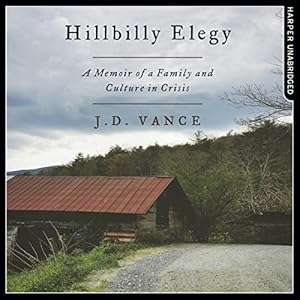Anyone looking for an explanation of why poor white
working-class Americans voted for Donald Trump in the 2016 US election will be
disappointed by J. D. Vance’s bestselling autobiography. It is a classic American
rags to riches tale of social opposites and is slated for Hollywood endorsement
in the glory days of the Trump first term.
 But it does not explain how the American
poor came to believe Trump’s promises or could possible identify with a man who
inherited his wealth from his father, avoided conscription to the war in
Vietnam and allegedly employed cruel and bullying tactics to harass
rent-controlled tenants from a building he wanted to redevelop overlooking New
York’s Central Park.
But it does not explain how the American
poor came to believe Trump’s promises or could possible identify with a man who
inherited his wealth from his father, avoided conscription to the war in
Vietnam and allegedly employed cruel and bullying tactics to harass
rent-controlled tenants from a building he wanted to redevelop overlooking New
York’s Central Park.
Vance, a Yale law school-educated investment manager, who
has espoused Republican values with a vengeance, rather like the alcoholic who becomes
a proselytising teetotaller, gives us his special take on the family and people
he has left far behind, the so-called hillbillies of the Appalachian Mountains,
and charts the highs and lows of his early life and the lives of his absent
father and his substance-abusing mother. His childhood and adolescence are
startlingly similar to those of that Californian hillbilly the late Charlie Manson.
Vance credits his ability to move away from his roots to the relative stability
of his grandmother Mamaw, and a certain amount of luck.
With his wife Usha, Vance is now on the other side of the
tracks, and his antipathy and disdain for the so-called ‘Welfare Queens’, the
recipients of welfare who have been the enemies of Republicans since the days
of Ronald Reagan, is uncompromising. Of those on welfare, he recalls, ‘I could
never understand why our lives felt like a struggle while those living off government
largesse enjoyed trinkets that I only dreamed about.’
Vance himself was helped first (and probably most) by
joining the marines, in a military much less class based than the British, and
then by government loans. From the comfort of his now moneyed life, Vance is
able to share the uncomprehending anger he has instinctively felt in his new
life, particularly with regard to his wife, details of whose background he
chooses not to share with his readers, and episodes such as when he spits out
Italian sparkling water at a formal dinner, thinking he had been given,
possibly unkindly, something unspeakable to drink.
It is not difficult to understand quite why this book has
become so garlanded: it seems to confirm everyone’s prejudices, left and right,
liberal and conservative. And the sad fact is that little will change in the
USA, with the rich getting more and the poor losing more, until everything
comes to a breaking point and dissatisfaction with the status quo leads to riot
and revolution: Manson’s oh so prescient ‘Helter Skelter’.
* * *
© copyright 2018 AudioBooksReview. All rights reserved.
Buy Hillbilly Elegy
